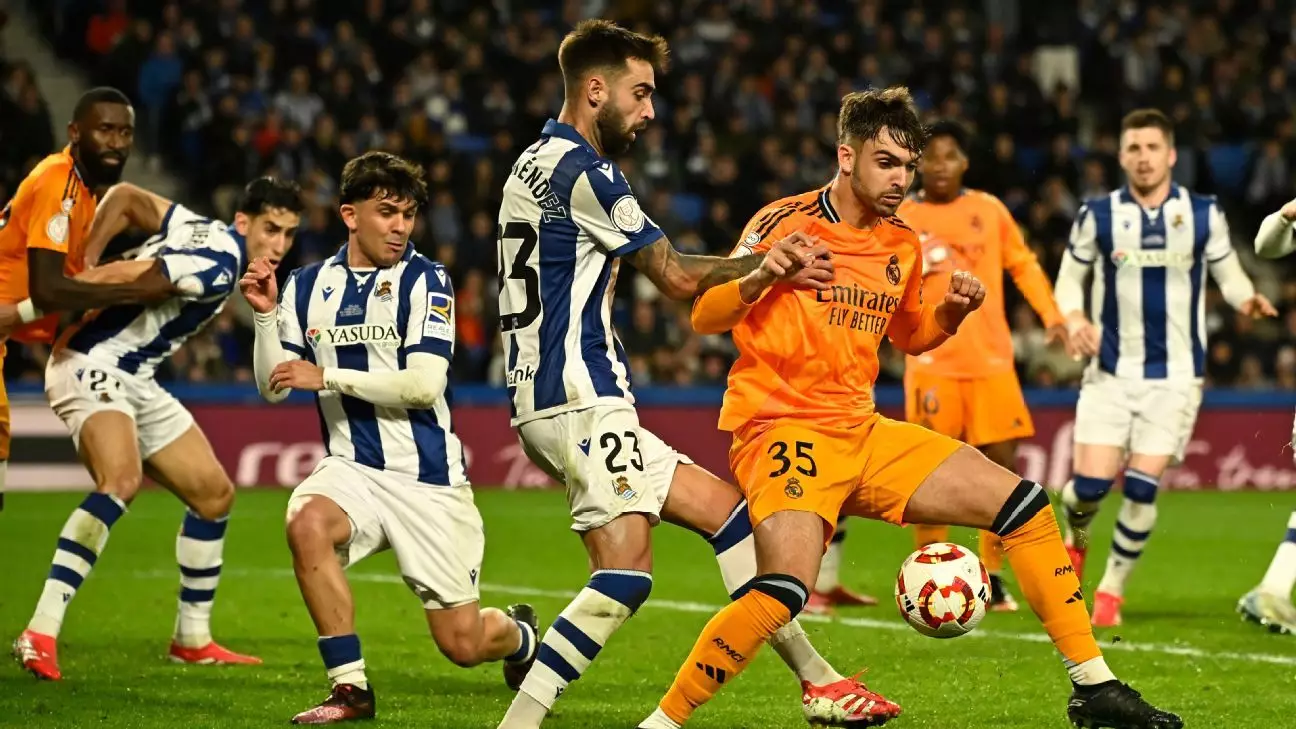The recent Copa del Rey match between Real Madrid and Real Sociedad was far more than a simple fixture in Spain’s storied football calendar; it was a stark reminder of the embedded issues surrounding racism and intolerance in sports. The match, which took place at the Reale Arena, was interrupted just before halftime due to disconcerting chants directed at Madrid defender Raúl Asencio, reportedly including the phrase “Asencio, die.” This incident highlights the urgent need for discussions about the culture within stadiums and the responsibility of fans to foster respect towards all individuals, regardless of their affiliation.
Upon hearing the hateful chants, Real Madrid’s captain Vinícius Júnior swiftly alerted the match referee, José María Sánchez Martínez, prompting the activation of Spain’s anti-hate protocol. This procedure involves showing a message on the stadium’s screens to disavow such intolerance clearly. The displayed message was unequivocal: “No to racist, xenophobic or intolerant chants. Support the team, respecting the opponent.” While the implementation of this protocol represents a positive step in addressing unacceptable behavior, it underscores an ongoing issue where words alone may not suffice to eradicate deeply rooted prejudice among some fans.
Adding to the complexity of the situation is the backdrop of an ongoing investigation involving Asencio. A court in the Canary Islands is looking into his alleged involvement in the distribution of a sexually explicit video involving a minor—a serious accusation that complicates public perception and could have significantly affected his performance and mental state during the match. The challenges he faces are numerous; not only must he navigate his professional responsibilities, but he must also endure external pressures from legal situations that threaten to overshadow his contributions on the pitch.
Given the emotional toll of the situation, Real Madrid’s coach Carlo Ancelotti made the decision to substitute Asencio at halftime. Ancelotti indicated that the defender had been visibly affected by the taunts and was already on a yellow card. His statement emphasized the emotional vulnerability of players in the face of aggressive fan behavior, noting, “Nobody likes a stadium to sing ‘die’ at them.” This decision to remove Asencio not only highlights a protective instinct from the coach but also speaks volumes about the mental health considerations in sports environments, where the psychological impact of public scrutiny can weigh heavily on young athletes.
The incident received condemnation from various stakeholders on both teams. Real Sociedad captain Mikel Oyarzabal strongly voiced his disapproval of the chants, recognizing that while certain actions deserve criticism, this particular method of expressing discontent is unacceptable. His sentiments were echoed by Sociedad’s coach, Imanol Alguacil, who underscored the importance of fostering an environment free from hatred. These responses from key figures in football display the collective responsibility of players and coaches to combat intolerance within the sport actively.
As the dust settles on this incident, it becomes imperative for football stakeholders, including clubs, organizers, and fans, to reflect on the broader implications of such behaviors. The sporting arena should symbolize unity and respect, not division. Asencio, who debuted for Real Madrid’s first team amidst injury crises, now carries an additional burden—representing change and resilience in the face of adversity. This incident should inspire a concerted effort to promote inclusivity, ensuring that all players can excel on the field free from the shackles of hatred. Through education and collective action, perhaps we can look forward to a culture where mutual respect is the norm, rather than an aspiration.

